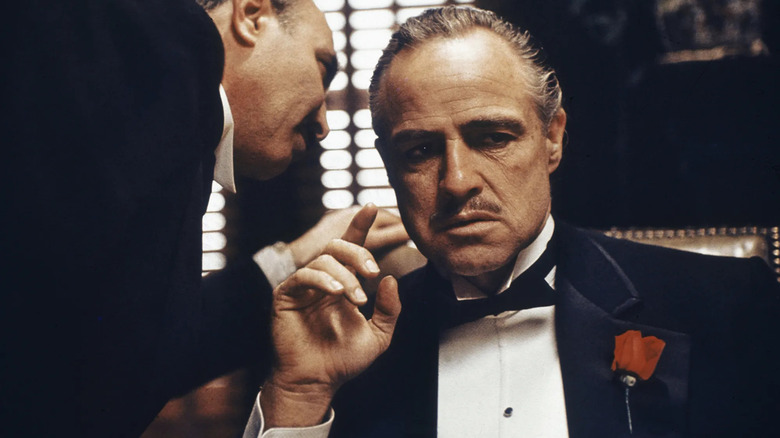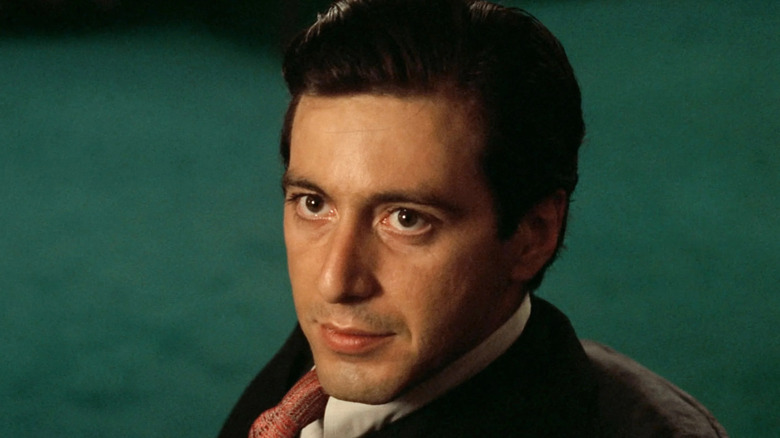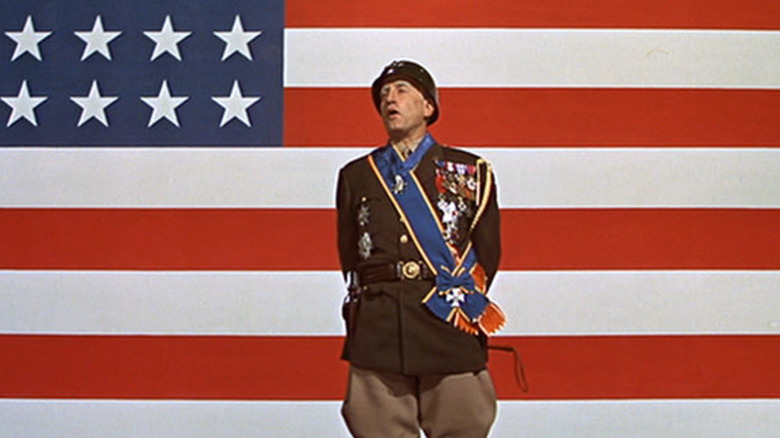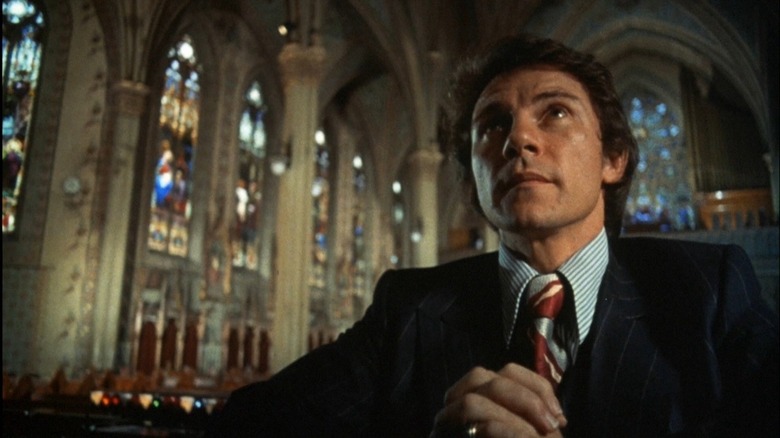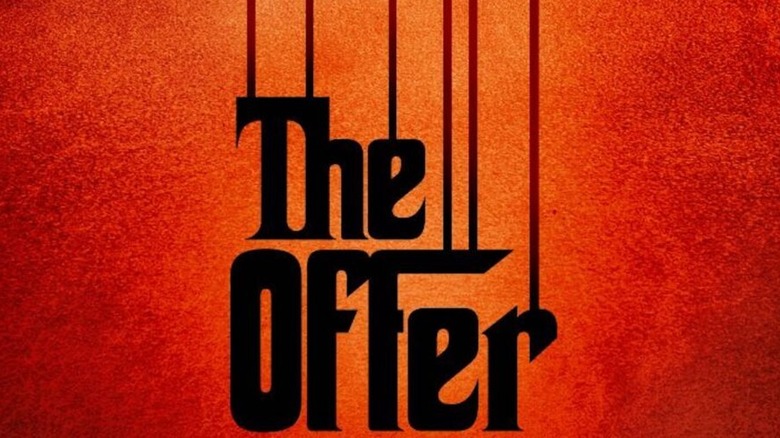Winning An Oscar Kept Francis Ford Coppola From Getting Fired From The Godfather
Even the most versatile directors have one film they'll be remembered for above all else. For Francis Ford Coppola, that film is "The Godfather." Coppola has other classics to his name, from "The Conversation" to "Apocalypse Now," but none have permeated pop culture in the same way that the 50-year-old mafia epic has. Yet, Coppola almost didn't make it through the production of "The Godfather." As he tells it, the only thing that saved his job was winning an Oscar for an unrelated movie.
How and why Coppola got the gig
If you told Coppola during the production of "The Godfather" that the resulting film would be his magnum opus, he probably would've laughed in disbelief. For one, the film was purely a money job for him. He was unimpressed with Mario Puzo's novel, dismissing it as "sleazy." Still, Coppola needed the money to keep his production company, American Zoetrope, in business, and so he accepted Paramount's offer to direct.
Paramount, however, didn't have much respect for Coppola; they chose him to direct primarily because of his Italian heritage. Robert Evans, then head of Paramount, wanted an Italian cast and crew to make "The Godfather," hoping this would add authenticity to the film's depiction of Italian-American culture. When Sergio Leone passed, the studio settled for Coppola.
Production didn't get any smoother once Coppola came aboard. The director clashed with Evans all the way through. Coppola had to fight tooth-and-nail for every major creative decision, from casting Marlon Brando and Al Pacino to shooting the film in New York instead of the more economical St. Louis. Paramount also wanted the film to be set in contemporaneous times, while Coppola insisted it be a 1940s period piece like Puzo's novel.
Ultimately, Coppola prevailed on all these decisions, but they didn't endear him to Evans. Coppola has since said there were three or four times when he felt he was in danger of being fired from the project. According to "Godfather: The Intimate Francis Ford Coppola" by Gene D. Phillips, Paramount had Elia Kazan waiting in the wings to take over from Coppola. In the end, it was the Coppola-scripted "Patton" that saved the director's job on "The Godfather."
Why Patton mattered
Though "Patton" was directed by Franklin J. Schaffner, Coppola co-wrote the film with Edmund H. North. The iconic opening scene of Patton delivering a speech before an enormous American flag was Coppola's idea. As he recalled:
"I wrote the script of 'Patton.' And the script was very controversial when I wrote it, because they thought it was so stylized. It was supposed to be like, sort of, you know, 'The Longest Day.' And my script of 'Patton' was—I was sort of interested in the reincarnation. And I had this very bizarre opening where he stands up in front of an American flag and gives this speech. Ultimately, I wasn't fired, but I was fired, meaning that when the script was done, they said, "Okay, thank you very much," and they went and hired another writer and that script was forgotten. And I remember very vividly this long, kind of being raked over the coals for this opening scene."
George C. Scott and producer David Brown saved this opening scene, and indeed, the entire original script. After Scott stepped in to replace Burt Lancaster, he expressed dissatisfaction with the script. Brown passed Coppola's draft onto Scott, which the star enjoyed. Thus, "Patton" went ahead with Coppola and North's draft as the shooting script.
The Oscar that saved The Godfather
Coppola still remembers how he learned his "Patton" script was being used:
"George [Lucas] and I had these horizontal editing machines, which no one else had because I was always interested in technology. We had no money. We were really on the verge of going out of business. So, we would live by renting these machines and one was rented to Fox. We got a call that it was broken, send a repairman. Of course, there was no repairman, so I went down. It really wasn't broken. They were threading it wrong. I threaded it right and said look, here. Then I saw the scenes that I recognized from my script. I said what is this movie? They said this is Patton."
Said script went on to win Coppola and North an Oscar for Best Original Screenplay, but Coppola wasn't there to accept this honor. He watched the ceremony from New York with his friend, a fellow by the name of Martin Scorsese, and they witnessed Coppola's win together:
"I was thrilled, and Marty said to me, 'I don't think they're going to fire you now.' He was right. In other words, they probably wouldn't fire me for a while because, how do you have the guy who wrote your script and is directing your film and then he wins an Oscar and then you fire him? Marty recognized that winning the Oscar was going to preserve me. I was really worried."
The results
The rest is history. "The Godfather" was instantly hailed as a masterpiece by audiences, critics, and Coppola's filmmaking peers. It even netted him a second Best Screenplay win (in the Adapted category rather than Original). Coppola's artistic choices were vindicated, and Paramount had both a critical and popular hit on their hands. Now, the studio was pushing a director they almost fired to make a sequel. After they declined Coppola's suggestion they give the job to Scorsese, he put forth his asking price of $1 million. The studio accepted.
"The Godfather Part II" ended up being a much smoother production for Coppola:
"It took 103 days, but it had scenes in Lake Tahoe, Las Vegas, the Dominican Republic, Italy, and in period New York... We went to Sicily, and the sun never came out. Well, why would you want to shoot Sicily if there's no sun? For many days, we just sort of said, 'Well, there's no sun. Let's go home.' It was a very complicated movie — much more complicated than the first 'Godfather,' but there was no interference. I was the producer, and it went very smoothly."
For those interested in the behind-the-scenes story of "The Godfather," a mini-series detailing just that will be premiering on Paramount+ on April 28, 2022. Titled "The Offer," the series will feature Coppola played by Dan Folger opposite Matthew Goode as Robert Evans. Time will only tell if even a dramatization like "The Offer" will successfully capture how stressful a production "The Godfather" was for those involved, especially Coppola.
